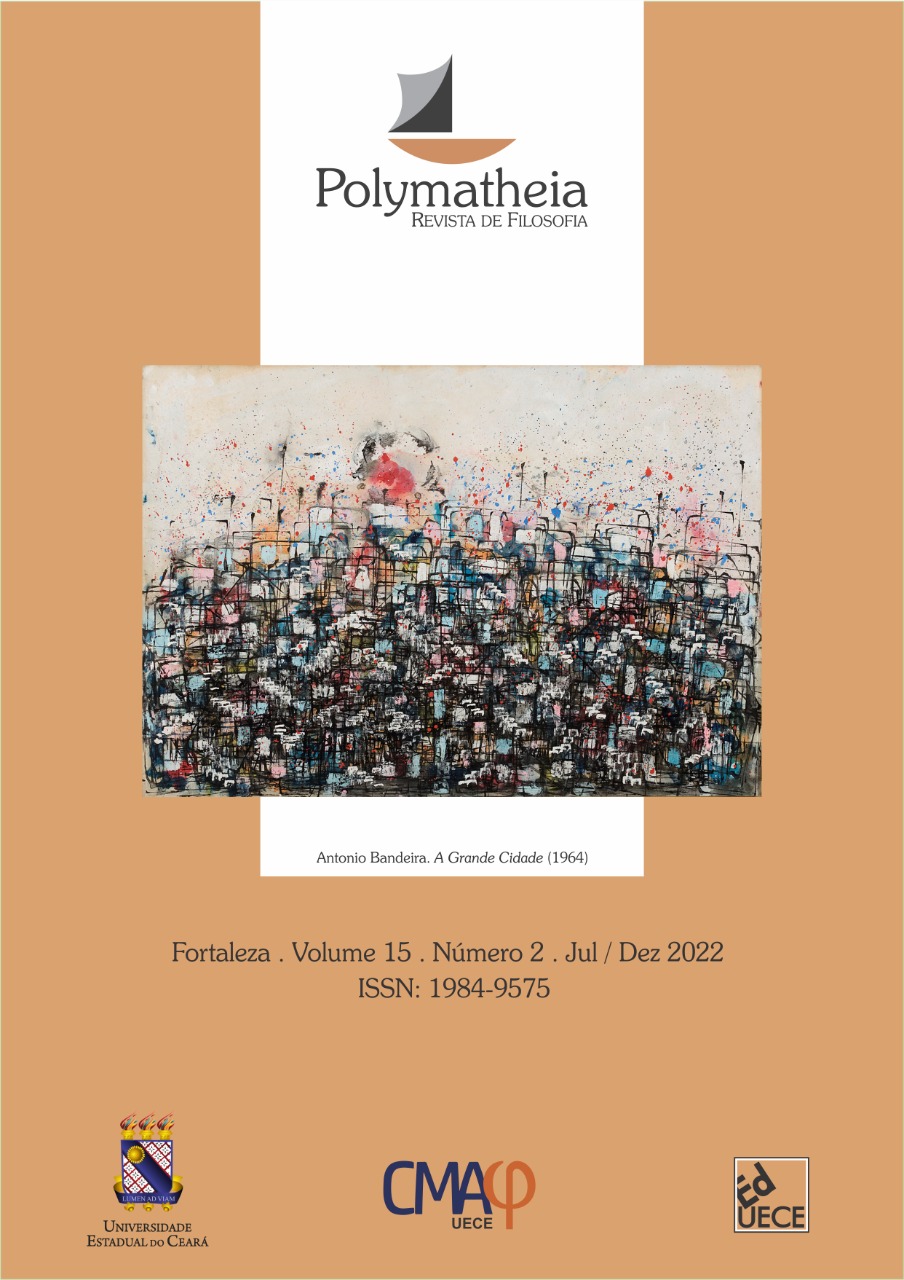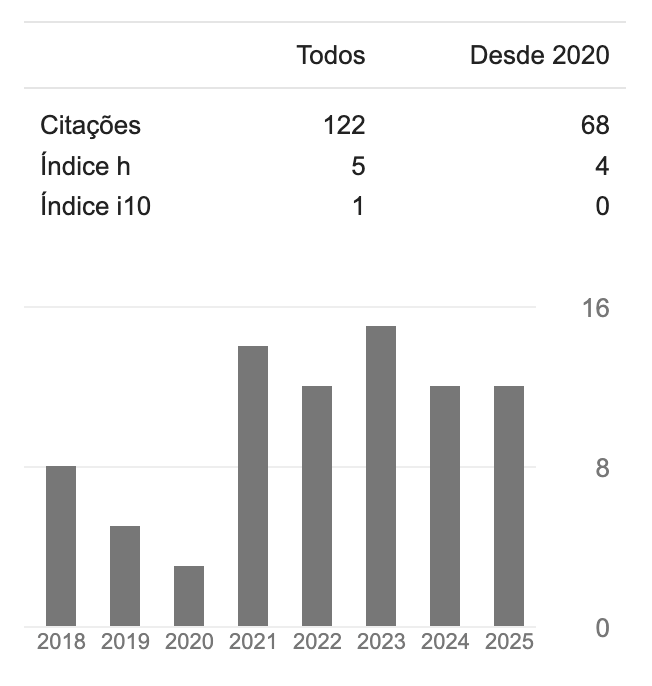Sobre a divisão da alma em Aristóteles
Mots-clés :
Ética, Felicidade, Bem Supremo, Virtude, AlmaRésumé
A ética aristotélica prevê a felicidade como o bem supremo e fim a ser alcançado. Sendo, o bem supremo uma atividade da alma, o presente trabalho pretende analisar a teoria de tripartição da alma e suas ramificações. Investigar a ideia da virtude, moral e intelectual, como meio para alcançar o fim último, uma vez que, a busca pelo bem supremo é alcançado por meio da prática da perfeita virtude
Téléchargements
Références
ARISTÓTELES. Ética a Nicômaco. Os Pensadores, Vol.I, Trad. Leonel Vallandro &Gerd Bornheim da versão inglesa de W.D. Ross. São Paulo. Abril Cutural, 1973.
ARISTÓTELES. De Anima. Apresentação, tradução e notas de Maria Cecília Gomes Reis. São Paulo. Ed. 34, 2006.
BOBONICH, Christopher; DESTREE, Pierre. krasia in Greek Philosophy: From Socrates to Plotinus. Netherlands: Brill Academic, 2007.
BOSTOCK, David. Aristotle´s Ethics. Oxford: Oxford University Press, 2000. BROADIE, Sarah. Ethics with Aristotle. New York: Oxford University Press, 1991.
BROADIE, Sarah. Aristotle and Beyond: Essays on Metaphysics and Ethics. Cambridge: Cambridge University Press, 2007.
BURGER, Ronna. Aristotle´s Dialogue with Socrates: on the Nicomachean Ethics.
Chicago: The University of Chicago Press, 2008.
CHARLES, David. Aristotle´s Philosophy of Action. London: Duckworth, 1984.
CHARLES, David. Aristotle´s Weak Akrates: What does her Ignorance Consist in?.
Akrasia in Greek Philosophy. Netherlands, Vol. 106, P. 139-166, 2007. (artigo)
COOPE, Ursula. Why does Aristotle Think that Ethical Virtue is Required for Practical Wisdom?. Phronesis. Netherlands, Vol. 57, Ex. 2, P.142–163, 2012. ( artigo)
COOPER, John M. Reason and Emotion: Essays on Ancient Moral Psychology and Ethical Theory. Princeton: Princeton University Press, 1999.
CURZER, Howard J. How Good People Do Bad Things: Aristotle on the Misdeeds of the Virtuous. Oxford Studies in Ancient Philosophy. Oxford University Press, Vol. 25, P. 233–272, 2005.
DAHL, Norman O. Practical Reason, Aristotle, and Weakness of Will.
Minneapolis: University of Minnesota Press, 1984.
DIRLMEIER. F. ARISTOTELES, Nikomachische Ethik. Berlin, 1969.
FORTENBAUGH, W.W. Aristotle on Emotion. London: Duckworth., 1975. GOTTLIEB, Paula. Aristotle on Dividing the Soul and Uniting the Virtues.
Phronesis. Netherlands, Vol. 39, Ex.3, P. 275–290, 1994.
GRONGROSS, Gosta. Listening to Reason in Aristotle´s Moral Psychology. Oxford Studies in Ancient Philosophy. Oxford University Press, Vol 32, P. 252-272, 2007.
HALPER, Edward. The Unity of the Virtues in Aristotle. Oxford Studies in Ancient Philosophy. Oxford University Press, Vol. 17, P. 115-144, 1999.
KEYT, David. Intellectualism in Aristotle. The Society for Ancient Greek Philosophy newsletter. University of Washigton: Vol 7, P. 138-157, 1978.
LEUNISEN, Mariska. From Natural Character to Moral Virtue in Aristotle.
New York: Oxford University Press, 2017.
LORENZ, Hendrik. The Brute Within: Appetitive Desire in Plato and Aristotle.
Oxford: Clarendon Press, 2006.
MACDOWELL, J. Some Issues in Aristotle’s Moral Psychology. Mind, Value, and Reality. Cambridge: Harvard University Press, Vol. 1, P. 23-49, 1998.
MOSS, J. Aristotle on the Apparent Good: Perception, Phantasia, Thought, and Desire. Oxford: Oxford University Press 2012.
PAKALUK, Michael; PEARSON, Giles. Moral Psychology and Human Action in Aristotle. Oxford: Oxford University Press, 2010.
PEARSON, G. Aristotle on Desire. Cambridge: Cambridge University Press, 2012.
SEGVIC, Heda. Aristotle´s Metaphysics of Action. Philosophiegeschichte und logische Analyse / Logical Analysis and History of Philosophy. Netherlands: Brill, Vol. 5, P. 23-53, 2002.
WHITING, Jennifer. Human Nature and Intellectualism in Aristotle. Archiv für Geschichte der Philosophie. Cambridge: Harvard University Press, Vol. 68, P. 70- 95, 1986.
ZINGANO, Marco. Razão e Sensação em Aristóteles: Um ensaio sobre o De Anima III 4-5. São Paulo: L&PM Editores, 1998.
ZINGANO, Marco. Akrasia and the Method of Ethics. krasia in Greek Philosophy: From Socrates to Plotinus. Netherlands: Brill Academic, Vol. 106, P 167-192, 2007.
ZINGANO, Marco. Estudo da Ética Antiga. São Paulo: Discurso Editorial, 2007.
ZINGANO, Marco. Ética a Nicômaco I 13 – III 8: O Tratado da Virtude Moral. São Paulo: Odysseus, 2008.











